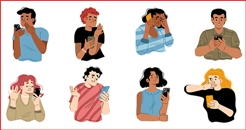 Why news is so negative
Why news is so negative
From an article on Readtangle
If a headline reads, "Some very sad, terrible news to share", it's hard to resist opening the article. It makes an important point though - consuming news of the awful is addictive.
Headlines that evoke emotion like this one continue to thrive. In the media, there is an industry cliché, "if it bleeds, it leads." Local newspapers and television stations have understood our addiction to the awful for as long as there has been news, but it's a fact whose consequences we don't talk about nearly enough.
Negativity bias is something we are all familiar with, whether implicitly or explicitly. If you get mostly positive feedback but a few negative ones, it's the negative that stick, the ones that you reply to and think about before you go to bed at night.
This observation is not just anecdotal but backed by numerous different kinds of research, which have produced a variety of alarming takeaways. Researchers measure the frequency of negative news by looking for specific words in headlines and articles that evoke negative emotion. Over the years, negative news has become more common.
Researchers have also found that negative news spreads faster on Twitter than positive news. As a result, there are incentives for news organizations to publish more negative news than positive news.
Unfortunately, we also know the impact consuming this type of news has on people. Today, consumption of nonstop negative news, regardless of its impact on our depression and anxiety, is so common it has its own name: "Doomscrolling."
Studies have linked deteriorating mental health to news exposure through major events like terrorist attacks or natural disasters. The more news a person consumed during or after the event, the more likely they were to be anxious and depressed. One study, in which participants were shown positive, negative and neutral news bulletins, found that the people exposed to the negative ones didn't just worry more about the specific issue or topic covered, but worried more about unrelated private concerns.
There are other, less obvious impacts negative news has on people besides inducing stress or increasing depression and anxiety.
Psychologists Amos Tversky and Daniel Kahneman have observed what they call the "Availability heuristic." This is the idea that people estimate the probability of an event or how often something happens by how easily they can recall instances of that event. In plain terms: We think things happen more often if we experience or learn of examples of those things. The classic case is plane crashes, which always make the news. People are much more scared of flying than driving, despite the fact that driving is exponentially more dangerous.
Even worse, this effect can make frequent news watchers less informed. A regular news-watcher might think, for instance, that crime is getting worse even when it’s getting better, simply because the increasingly negative news is covering crime a lot more.
However, as cognitive psychologist Steven Pinker put it, there is an inherent quality about news that creates problems for journalists — news is about things happening. "As long as bad things have not vanished from the face of the earth, there will always be enough incidents to fill the news, especially when billions of smartphones turn most of the world’s population into crime reporters and war correspondents."
Pinker also pointed to the Norwegian peace and conflict researcher Johan Galtung, who pegged the issue as being more about time and scale. If a newspaper only came out once every 50 years, Galtung argues, rather than once a day, it would not report on a half century of celebrity gossip and political scandal. Instead, it would write about the momentous global changes like the increase in life expectancy and the advances in science. It would, in real terms, likely produce much more uplifting reporting. Unfortunately, the frequency of news is increasing, not decreasing, and so we're reporting ever more incrementally on all the bad things that are happening instead.
Ultimately, though, there is an overwhelming mountain of evidence that the real negative news problem is us. It's humans.
There is an evolutionary argument here that we are all basically hardwired to prioritize negative information, because the potential costs of ignoring that information far outweigh the potential benefits of seeking positive information.
One answer may be as simple as the subject line. A study published in Nature found that, "for a headline of average length, each additional negative word increased the click-through rate by 2.3%."
Occasionally, the answer may actually have something to do with the publishers — or, at least, the platforms. From 2016 to 2019, we know that Facebook’s algorithms were giving "anger" emoji reactions to posts five times as much weight as "likes" when it decided which posts to show to other users. The result, unsurprisingly, is that really anger-inducing posts proliferated on Facebook during that time.
It is up to all of us to fight back against the negative forces of news. You can consider this a call to action. A call to seek out the problem solvers, elevate the good, and click on some stories that might bring you hope, rather than despair.
Read the full article here.
Could you get some good news stories out there?
Retweet about this article:
From an article on Readtangle, 06/06/2023